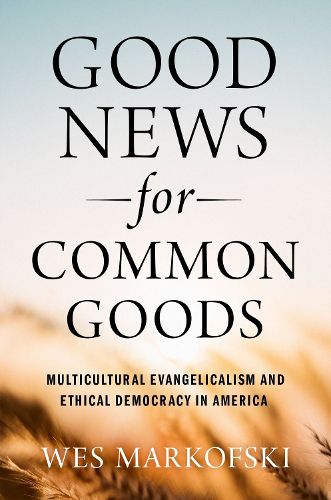Readings Newsletter
Become a Readings Member to make your shopping experience even easier.
Sign in or sign up for free!
You’re not far away from qualifying for FREE standard shipping within Australia
You’ve qualified for FREE standard shipping within Australia
The cart is loading…






What is the relationship between evangelical Christianity and democracy in America? In Good News for Common Goods, sociologist Wes Markofski explores how multicultural evangelicals across the United States are addressing race, poverty, inequality, politics, and religious and cultural difference in America's increasingly plural and polarized public arena. Based on extensive original research on multicultural evangelicals active in faith-based community organizing, community development, political advocacy, and public service organizations across the country-including over 90 in-depth interviews with racially diverse evangelical and non-evangelical activists, community leaders, and neighborhood residents-Markofski shows how the varieties of public religion practiced by evangelical Christians are not always bad news for non-evangelicals, people of color, and those advancing ethical democracy in the United States.Markofski argues that multicultural evangelicals can and do work with others across race, class, religious, and political lines to achieve common good solutions to public problems, and that they can do so without abandoning their own distinctive convictions and identities or demanding that others do so. Just as ethical democracy calls for a more reflexive evangelicalism, it also calls for a more reflexive secularism and progressivism.
$9.00 standard shipping within Australia
FREE standard shipping within Australia for orders over $100.00
Express & International shipping calculated at checkout
What is the relationship between evangelical Christianity and democracy in America? In Good News for Common Goods, sociologist Wes Markofski explores how multicultural evangelicals across the United States are addressing race, poverty, inequality, politics, and religious and cultural difference in America's increasingly plural and polarized public arena. Based on extensive original research on multicultural evangelicals active in faith-based community organizing, community development, political advocacy, and public service organizations across the country-including over 90 in-depth interviews with racially diverse evangelical and non-evangelical activists, community leaders, and neighborhood residents-Markofski shows how the varieties of public religion practiced by evangelical Christians are not always bad news for non-evangelicals, people of color, and those advancing ethical democracy in the United States.Markofski argues that multicultural evangelicals can and do work with others across race, class, religious, and political lines to achieve common good solutions to public problems, and that they can do so without abandoning their own distinctive convictions and identities or demanding that others do so. Just as ethical democracy calls for a more reflexive evangelicalism, it also calls for a more reflexive secularism and progressivism.